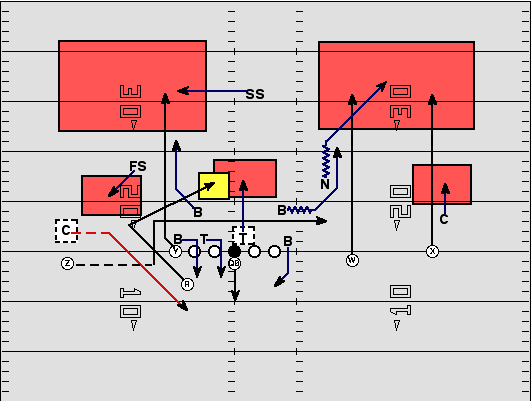
 Mike Tanier has written a follow-up to his previous article on MSNBC, focusing on the defense this time. As I wrote a response to the previous article, it only seems fitting to write a follow-up on the follow-up.
Mike Tanier has written a follow-up to his previous article on MSNBC, focusing on the defense this time. As I wrote a response to the previous article, it only seems fitting to write a follow-up on the follow-up.
In summary, Tanier’s previous article suggested that “tricky” offenses might suffer this year since there won’t be the same amount of time to prepare due to the lockout. My argument was that teams have spent years building an offensive philosophy (which they should not abandon for just one year) and that complexity has more to do with offensive philosophy and personnel rather than the learning capacity of players.
In this article, Tanier suggests that defenses will also be affected by the lockout, but to a lesser extent since “confusion favors the defense.” On one hand, defenses require less overall communication; each defensive player typically only works in conjunction with a couple other players (cornerbacks work with safeties but not really with defensive linemen for example).
Offensive players are more inherently required to communicate between the whole squad (wide receivers need to know who to block on running plays and running backs need to know who to block or where to go for passing plays). On the other hand, as I have previously mentioned, a lot can go wrong on a offensive play and still net positive yards, but it only takes one confused defensive player for a play to end in a big gain or a touchdown.
Tanier goes on the premise that one metric of defensive “trickiness” is the number of blitzers and the standard deviation in the number of blitzers. Again to me this seems a little simplistic:
- Personnel factors heavily into the play selection: One of the basic defensive premises of teams such as the Detroit Lions or the Chicago Bears is that a dominant front 4 should be able to generate all the pass rush needed to get to the quarterback. When a team invests big money into the likes of Ndamukong Suh or Julius Peppers basically they are saying that they don’t need fancy “pew pew” blitzes, the defensive line should be able to beat any offensive line straight on; and it works, the Bears and Lions generate lots of pass rush without having to rely on blitzing a lot of players. So really it shouldn’t come as any surprise that the Lions and Bears show up as some of the “simplest” defenses based on this metric since it’s not in their defensive philosophies to blitz more than 4 the majority of the time.
- Who the blitz comes from is important: The Packers on the other hand are a zone-fire “blitzburg” 3-4 defense, which is considered by many to be one of the most complex for offenses to account for. But what this metric doesn’t account for is who is blitzing. Just as having a dominant front 4 can allow you to drop more defenders in coverage, it also has the disadvantage that offenses typically will only have to account for the same 4 players in their blitz pickups. On the other hand, the Packers can blitz 4 players in multiple combinations, you might have a cornerback or safety be the extra blitzer or you can get very exotic and have the nose tackle drop back into coverage and have the blitz come from somewhere else. With more players to account for, offenses have to be in sync that much more to make the right calls. Take for example Charles Woodson, his mere presence is enough for some offenses to account for him and in many cases offenses have mistakenly accounted for him when he is actually in coverage. So in essence, Woodson and the defense are generating confusion and therefore pressure without having to do anything “tricky” just by having the perception of the blitz on their side.
- Where the blitz comes from is also important: The Packers love to blitz from unusual places at odd angles; how often did you see Charles Woodson blitz from the slot or Clay Matthews blitz from the spy position? Offenses will often have a harder time in protecting their quarterback when they have to account for so many different permutations of blitzes. Again even if the defense isn’t using these exotic blitz packages, offenses have to account for them.
- Offensive and defensive play calling play off each other: Defenses usually blitz mostly on passing plays, so it stands to reason that teams will blitz more versus a pass-heavy team such as the Packers and less for run-heavy teams such as the Tennessee Titans. Furthermore, teams would likely blitz more players against good offensive lines as opposed to bad offensive lines, on the premise that less players are needed to generate the same amount of pass rush against a bad offensive line than a good one. Finally and perhaps most importantly, defense will blitz more when the in the lead since they can afford to run more risky blitzing plays and since most offenses will abandon the run when they are significantly behind.
Defensive “trickiness” is not simply about how many players blitz, but also the situation in which the blitz is used, not limited to factors including what kind of players a team has at its disposal, what kind of defense they run and where the blitz is coming from. Interestingly, the Packers and Steelers, who run a version of the 3-4 defense that is considered to be one of the most complex in the league, are not in the top 5 most “tricky” defenses in the metric.
So in conclusion, again “tricky” does not necessarily mean complex and teams have different capacities to run “tricky” plays, so just because a team has a “tricky” defense doesn’t mean that they will suffer due to the lockout. Mike Tanier might want to take the advice of Doug Farrar, another Football Outsider writer:
——————
Thomas Hobbes is a staff writer for Jersey Al’s AllGreenBayPackers.com.
——————

IDK,but I get the sense from this guy Tanier that the lockout has taken away all the progress of a guy like Capers”virtual reality”game and they must dust off the “atari” system.
I’m confused. Good job Thomas, I agree that you can’t rely on two elements of the games to predict anything substantive. The mix of elements is far too large and unpredictable to make judgement on the impact of a non-event, the lock-out.
It will all be settled by August 1st anyway. This will not be a big deal.
The unreliable Sports Press Mainstream are sounding more positive. Are they ever right? Not often!
MM I sincerely hope you are right.